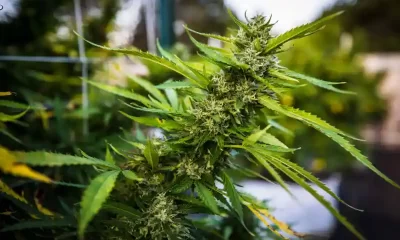Business
Colorado Gov. Sends Letter to Commend Biden Administration for Making Progress on Rescheduling Cannabis

Governor Jared Polis praises progress but also calls for attention to cannabis banking and other issues.
Colorado Gov. Jared Polis recently sent a letter to President Joe Biden on Sept. 5 regarding the U.S. Department of Health and Human Services’ (HHS) recommendation for the Drug Enforcement Administration (DEA) to reschedule cannabis from a Schedule I substance to a Schedule III substance.
According to The Gazette, Polis’ letter addressed this recommendation, and applauded Biden on leading an administration toward progress. “We are pleased to hear that you have recently received Health and Human Services’s (HHS) recommendation to move cannabis to Schedule III,” Polis began in his letter. “It’s about time.”
“This is an historic moment and we owe you and your administration a debt of gratitude for your leadership on catching up with where the science is,” Polis continued. “Cannabis’ current classification under federal law as a Schedule I drug is contradicted by the scientific evidence. The notion, as previously considered, that cannabis has no accepted medical use, a high potential for abuse, and no accepted safety standards even under medical supervision has been widely disproven, HHS’s recommendation is evidence-based and a move in the right direction.”
He continues that he offers his “enthusiastic support” while the country waits for the DEA to respond, but in the meantime, urges the president to begin thinking about what else needs to be done to make moving cannabis to Schedule III ideal for cannabis businesses. “I ask you to simultaneously consider a few next steps in the near future by showing your support for access to banking for the state-regulated marketplace, reduced criminal penalties for possession and distribution of cannabis, addressing immigration-related consequences and enforcement discretion from FDA,” Polis wrote.
Polis also addresses the issues that still need to be resolved, such as banking. He wrote that if cannabis becomes a Schedule III substance, banks would be free to serve cannabis businesses and that tax code 280E would no longer be necessary. “The most efficient way to address these public health risks is to displace the illicit marketplace and replace it with a legal, safe, regulated, and age-verified system,” Polis continued. “But we can only do that by promoting federal policies that allow for profitability in these well-established state-regulated marketplaces. That equates to [Internal Revenue Code] Section 280E reform and access to traditional banking services.”
Polis noted that rescheduling cannabis will become a hallmark accomplishment of Biden’s term as president. “Your administration will soon be credited with saving hundreds of thousands of jobs and significant tax revenue for the states when DEA solidifies FDA’s recommendation,” Polis writes. “While federal prohibition continues, more than three-fourths of the states have legalized medicinal marijuana, and more than 20 have legalized marijuana for adult use.”
“Let’s celebrate this progress and work together to finish the job,” his letter to Biden concluded. “We greatly appreciate your leadership, and please come visit Colorado again soon.”
Nearly a year ago on Oct. 6, 2022, Biden made a historic announcement to pardon of thousands of federal cannabis prisoners. He also called for the HHS secretary and the attorney general to “to initiate the administrative process to review expeditiously how marijuana is scheduled under federal law,” Biden said. “Federal law currently classifies marijuana in Schedule I of the Controlled Substances Act, the classification meant for the most dangerous substances. This is the same schedule as for heroin and LSD, and even higher than the classification of fentanyl and methamphetamine—the drugs that are driving our overdose epidemic.”
In response to Biden’s request last year, HHS Assistant Secretary for Health, Rachel Levine, sent a letter to DEA Administrator Ann Milgram on Aug. 29 regarding recommendations for moving cannabis into the Schedule III category. “Following the data and science, HHS has expeditiously responded to President Biden’s directive to HHS Secretary [Xavier Becerra] and provided its scheduling recommendation for marijuana to the DEA on August 29, 2023,” an HHS spokesperson said.
According to a statement provided to The Hill by a DEA spokesperson, it’s the DEA’s turn to review the recommendations. “As part of this process, HHS conducted a scientific and medical evaluation for consideration by DEA. DEA has the final authority to schedule or reschedule a drug under the Controlled Substances Act. DEA will now initiate its review,” the spokesperson said. It is unclear how long it will take for the DEA to review the recommendations, or how the department will respond.
The Controlled Substances Act of 1970 labeled cannabis as a Schedule I substance over 50 years ago. Schedule I substances currently include cannabis, heroin, LSD, ecstasy, and peyote, among others, which are described as having no medical benefits and a high potential for abuse. Schedule II substances also have high potential for abuse, but potentially lead to “severe psychological or physical dependence,” such as Vicodin, cocaine, meth, oxycodone, fentanyl, Adderall, and more. Schedule III substances however, are simply drugs with “moderate to low potential for physical and psychological dependence,” like ketamine and testosterone.
Business
New Mexico cannabis operator fined, loses license for alleged BioTrack fraud

New Mexico regulators fined a cannabis operator nearly $300,000 and revoked its license after the company allegedly created fake reports in the state’s traceability software.
The New Mexico Cannabis Control Division (CCD) accused marijuana manufacturer and retailer Golden Roots of 11 violations, according to Albuquerque Business First.
Golden Roots operates the The Cannabis Revolution Dispensary.
The majority of the violations are related to the Albuquerque company’s improper use of BioTrack, which has been New Mexico’s track-and-trace vendor since 2015.
The CCD alleges Golden Roots reported marijuana production only two months after it had received its vertically integrated license, according to Albuquerque Business First.
Because cannabis takes longer than two months to be cultivated, the CCD was suspicious of the report.
After inspecting the company’s premises, the CCD alleged Golden Roots reported cultivation, transportation and sales in BioTrack but wasn’t able to provide officers who inspected the site evidence that the operator was cultivating cannabis.
In April, the CCD revoked Golden Roots’ license and issued a $10,000 fine, according to the news outlet.
The company requested a hearing, which the regulator scheduled for Sept. 1.
At the hearing, the CCD testified that the company’s dried-cannabis weights in BioTrack were suspicious because they didn’t seem to accurately reflect how much weight marijuana loses as it dries.
Company employees also poorly accounted for why they were making adjustments in the system of up to 24 pounds of cannabis, making comments such as “bad” or “mistake” in the software, Albuquerque Business First reported.
Golden Roots was fined $298,972.05 – the amount regulators allege the company made selling products that weren’t properly accounted for in BioTrack.
The CCD has been cracking down on cannabis operators accused of selling products procured from out-of-state or not grown legally:
- Regulators alleged in August that Albuquerque dispensary Sawmill Sweet Leaf sold out-of-state products and didn’t have a license for extraction.
- Paradise Exotics Distro lost its license in July after regulators alleged the company sold products made in California.
Golden Roots was the first alleged rulebreaker in New Mexico to be asked to pay a large fine.
Source: https://mjbizdaily.com/new-mexico-cannabis-operator-fined-loses-license-for-alleged-biotrack-fraud/
Business
Marijuana companies suing US attorney general in federal prohibition challenge

Four marijuana companies, including a multistate operator, have filed a lawsuit against U.S. Attorney General Merrick Garland in which they allege the federal MJ prohibition under the Controlled Substances Act is no longer constitutional.
According to the complaint, filed Thursday in U.S. District Court in Massachusetts, retailer Canna Provisions, Treevit delivery service CEO Gyasi Sellers, cultivator Wiseacre Farm and MSO Verano Holdings Corp. are all harmed by “the federal government’s unconstitutional ban on cultivating, manufacturing, distributing, or possessing intrastate marijuana.”
Verano is headquartered in Chicago but has operations in Massachusetts; the other three operators are based in Massachusetts.
The lawsuit seeks a ruling that the “Controlled Substances Act is unconstitutional as applied to the intrastate cultivation, manufacture, possession, and distribution of marijuana pursuant to state law.”
The companies want the case to go before the U.S. Supreme Court.
They hired prominent law firm Boies Schiller Flexner to represent them.
The New York-based firm’s principal is David Boies, whose former clients include Microsoft, former presidential candidate Al Gore and Elizabeth Holmes’ disgraced startup Theranos.
Similar challenges to the federal Controlled Substances Act (CSA) have failed.
One such challenge led to a landmark Supreme Court decision in 2005.
In Gonzalez vs. Raich, the highest court in the United States ruled in a 6-3 decision that the commerce clause of the U.S. Constitution gave Congress the power to outlaw marijuana federally, even though state laws allow the cultivation and sale of cannabis.
In the 18 years since that ruling, 23 states and the District of Columbia have legalized adult-use marijuana and the federal government has allowed a multibillion-dollar cannabis industry to thrive.
Since both Congress and the U.S. Department of Justice, currently headed by Garland, have declined to intervene in state-licensed marijuana markets, the key facts that led to the Supreme Court’s 2005 ruling “no longer apply,” Boies said in a statement Thursday.
“The Supreme Court has since made clear that the federal government lacks the authority to regulate purely intrastate commerce,” Boies said.
“Moreover, the facts on which those precedents are based are no longer true.”
Verano President Darren Weiss said in a statement the company is “prepared to bring this case all the way to the Supreme Court in order to align federal law with how Congress has acted for years.”
While the Biden administration’s push to reschedule marijuana would help solve marijuana operators’ federal tax woes, neither rescheduling nor modest Congressional reforms such as the SAFER Banking Act “solve the fundamental issue,” Weiss added.
“The application of the CSA to lawful state-run cannabis business is an unconstitutional overreach on state sovereignty that has led to decades of harm, failed businesses, lost jobs, and unsafe working conditions.”
Business
Alabama to make another attempt Dec. 1 to award medical cannabis licenses

Alabama regulators are targeting Dec. 1 to award the first batch of medical cannabis business licenses after the agency’s first two attempts were scrapped because of scoring errors and litigation.
The first licenses will be awarded to individual cultivators, delivery providers, processors, dispensaries and state testing labs, according to the Alabama Medical Cannabis Commission (AMCC).
Then, on Dec. 12, the AMCC will award licenses for vertically integrated operations, a designation set primarily for multistate operators.
Licenses are expected to be handed out 28 days after they have been awarded, so MMJ production could begin in early January, according to the Alabama Daily News.
That means MMJ products could be available for patients around early March, an AMCC spokesperson told the media outlet.
Regulators initially awarded 21 business licenses in June, only to void them after applicants alleged inconsistencies with how the applications were scored.
Then, in August, the state awarded 24 different licenses – 19 went to June recipients – only to reverse themselves again and scratch those licenses after spurned applicants filed lawsuits.
A state judge dismissed a lawsuit filed by Chicago-based MSO Verano Holdings Corp., but another lawsuit is pending.
Source: https://mjbizdaily.com/alabama-plans-to-award-medical-cannabis-licenses-dec-1/
-

 Business2 years ago
Business2 years agoPot Odor Does Not Justify Probable Cause for Vehicle Searches, Minnesota Court Affirms
-

 Business2 years ago
Business2 years agoNew Mexico cannabis operator fined, loses license for alleged BioTrack fraud
-

 Business2 years ago
Business2 years agoAlabama to make another attempt Dec. 1 to award medical cannabis licenses
-

 Business2 years ago
Business2 years agoWashington State Pays Out $9.4 Million in Refunds Relating to Drug Convictions
-

 Business2 years ago
Business2 years agoMarijuana companies suing US attorney general in federal prohibition challenge
-

 Business2 years ago
Business2 years agoLegal Marijuana Handed A Nothing Burger From NY State
-

 Business2 years ago
Business2 years agoCan Cannabis Help Seasonal Depression
-

 Blogs2 years ago
Blogs2 years agoCannabis Art Is Flourishing On Etsy













